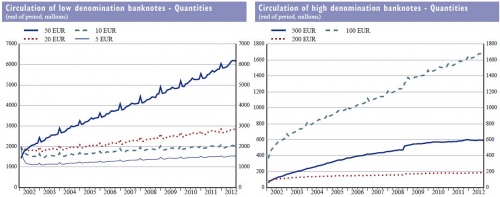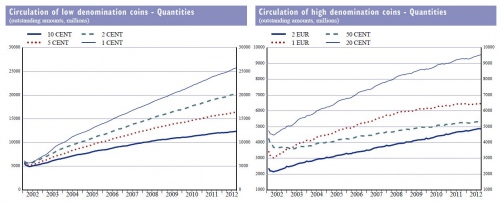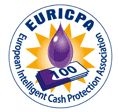ESTA Conference, Exhibition & General Assembly
2-4 June, 2013, Marseille, France
The Strengths of Cash: Accessible and Universal
The next ESTA conference is taking place in Marseille, at the Mercure
Centre Hotel. We expect this to be a popular destination, so please
reserve your place at the conference early to avoid disappointment.

The number of conference places is limited, and your place is only secure once you have paid. Reservations will open on the
ESTA website by the end of November 2012.
We have a limited number of rooms at a specially negotiated price at the
Mercure Centre Hotel,
so book early to have the most convenient location in sunny Marseille,
which also happens to be European cultural capital for 2013.
We also have rooms at negotiated prices at the following Accor hotels:
Sofitel Vieux Port Marseille, Novotel Vieux Port and MGallery Beauvau
Hotel.
European Central Bank News
Cash in circulation (ECB)
The latest information published by the European Central Bank shows that cash continues to grow:
The number of Euro notes in circulation at the end of Q3 2012 stood at
14,980 million, with a value of €892.5 billion, a slight drop of 0.12%
in volume, and a drop of 0.13% in value since Q2 2012. Viewed between Q1
and Q2, there was an increase of 4% in volume and a 2.7% in value.
In Q3 the total number of Euro coins in circulation grew to 101,072
million, while their value rose to €23,465 million, an increase of 1.25%
and 0.6% respectively since Q2 2012. The increase during the first half
of 2012 was slightly higher than Q3. The total number of Euro coins in
circulation grew by 1.5% and their value rose by 1.3% comparing Q1 with
Q2. The trend shows a general increase in numbers during 2012 with the
largest growth in Q2.
Click on graph to access detailed info on the low and high denomination euro coins.


Source: Cash in circulation (ECB)
The Cost of Making a Payment in the EU - ECB study shows cash is cheapest
A new study examining the cost of making a payment in the EU was
released by the European Central Bank in September of this year.
Thirteen national central banks participated in the study, which showed
that the cost of payments amounts to around 45 billion € or 1% of their
combined GDP. The prize for lowest unit cost in a majority of countries
went to cash, however in five of the 13 countries, the debit card comes
out cheapest. The ECB would not disclose which countries, but these are
most likely Nordic states. Cash payments amount to almost half of the
total costs, and have the lowest unit social cost, with the next least
expensive payment means being the debit card. Cash is still the most
frequently used payment instrument with 69% of transactions in the
sample countries made in cash, and 65% of all transactions in the EU 27
made in cash (figures for 2009).
Communication formats for cash transactions between National Central Banks and Professional Clients
A new system named DCES, Data Exchange for Cash Services, was launched
by the European Central Bank in October. The DCES is an interface,
hosted by the ECB, which translates between different Central Bank
communication standards. It allows banks and CIT companies to place cash
orders and notify cash lodgments to any non-domestic Central Bank via
their domestic Central Bank's local cash application.
The integration of the DCES interface with the Central Banks' domestic
cash applications has been tested successfully, and since the beginning
of October, in nine EU member states the system has been able to
exchange transaction messages from professional clients in case a bank
or CIT company wishes to withdraw or lodge cash, from or to, a
non-domestic Central Bank.
Countries operating the DCES in this first wave of implementation are:
Belgium, Denmark, Ireland, Cyprus, Luxembourg, Malta, the Netherlands,
Austria, and Finland.
European Commission, Parliament and Regulatory Developments
EC Impact Assessment on the continued issuance of 1 and 2 euro cent coins
The European Parliament has requested that the European Commission
Directorate General of Economic and Financial Affairs conduct an impact
assessment on the continued use of 1 and 2 euro cent coins. The study
will include a cost-benefit analysis taking into account the real
production costs of the coins set against their value and benefits.
These smallest denominations of coins account for 45.5% of the total
number of coins in circulation and represent 2.8% of the value of the
coins in circulation.


European
stakeholders have been asked to submit their views and ESTA has
participated by collating data from our members. ESTA members anticipate
that the cessation of 1 and 2 cent coins would have little impact on
their businesses. We expect the results of the impact assessment in the
coming months.
Cross-Border Regulation Reminder
The EU Regulation on cross-border transport of euro cash by road between
euro-area member states will be binding from December 1, 2012. These
are just a few facts you need to be aware of if you engage in
transporting euro cash to countries other than your own.
1. If you wish to transport or continue to transport euros to other
European countries having adopted the Euro, you need to apply for a
Community License from your national licensing authority, which is
valid for 5 years.
2. You no longer need an international haulage license for cross border euro transport.
3. Your national wages may not apply if you conduct cross-border
transport. The highest wage of all countries visited will apply to your
team.
4. Other currencies may be transported with the euros, up to 20% of the total.
5. Check with your authorities that they have informed the European
Commission of the secure methods of cross-border transport of euro cash.
Be sure that this method is acceptable as you may face unfair
competition from cross-border operators.
6. Extra training may be necessary for your teams. The EU has specified a
training programme that you may already cover, and which need not be
repeated. Arms licenses from the destination or transit country may also
be necessary. You will need to read the whole document to be fully
informed
www.esta-cash.eu/en/publications/
European Commission Green Paper adopted by European Parliament
The European Commission's 'Towards an integrated European market for
card, internet and mobile payments' report was adopted by the European
Parliament's ECON Committee this month. The European Parliament (EP) is
not satisfied with the current lack of transparency in payment costs.
The EP believes Multiple Interchange Fees are too high, and some MEPs
tried to have them banned but were voted down. The ECON Committee is
disappointed that the paper doesn’t address the comparative costs and
societal impacts of cash or cheque payments in comparison with card,
internet and mobile payments.
Click to read the report
The Electronic Payments Lobby
The Cash-Lite Society – the Better than Cash Alliance
This study was written by Bankable Frontier Associates, a consulting
firm promoting financial inclusion for the poor through a shift to
electronic payments. Published by the “Better than Cash Alliance”, the
study’s aim is to promote a deliberate and strategic shift toward
electronic payments through bulk payers: governments, the private sector
and the development aid sector. Members of the Better than Cash
Alliance include the Bill and Melinda Gates Foundation, Citi Bank, the
Ford Foundation and VISA. Their idea is to push governments of
developing nations to have a clear policy route to more electronic
payments, leading to a “cash lite” system. The authors admit that an
imminent cashless society is, however, unrealistic, and that what we are
really likely to see is a drift toward lower cash use. They accept
that electronic payments will have to co-exist with cash. What the
authors of the study don’t address is discrimination against the
marginalized poor who need to use cash as they are unbanked. The benefit
of increasing availability of cash to the poor is ignored. The authors
don’t examine how cash and electronic payments can cohabit effectively,
which weakens its impact, as this is the reality across the world.
Click to read the study
Supplier News
EURICPA Releases its Stained Notes Handling Recommendations
During September, EURICPA, the European Intelligent Cash Protection Association,

released
its recommendations on stained notes handling. Contributors to the
paper include Oberthur, Gehrer, Spinnaker, Villiger Security Solutions,
SQS Security Qube System and 3SI Security Systems. The paper has
specialized safety instructions for CIT companies following an ink
activation.
Click to read the paper
Fraud and Hacking
Global Card Fraud on the Rise shows Survey
A global study of more than 5,200 consumers across 17 countries
conducted by ACI Worldwide and the Aite Group, revealed that one in four
surveyed has been victimized by credit, debit or pre-paid card fraud
during the past five years. When people experience fraud around 21%
change their card provider. Of those getting a replacement card, 46% use
it less than the original card and more than 50% of fraud victims also
start using more cash.
Click to read the study
Smartphone Fraud Hacking
Two researchers from the
Intrepidus Group
have exploited the vulnerabilities of NFC (near field communication) in
smart phones. Corey Benninger and Max Sobell created an application
that takes advantage of a weakness in NFC-based subway cards that lets
users replenish their fare card balance for free. They announced their
discovery at the EUSecWest security conference in Amsterdam in September
this year. They had already alerted San Francisco and New Jersey
authorities in 2011, who were the subjects in their app experiment, and
point out that other cities have weaknesses in their systems also. The
implication of this research is that it indicates how just how quickly
and easily a criminal and fraudulent system can be developed. It is yet
another example showing how weak the security of mobile phone payments
can be.
Retail Research
RBR Report on the future of self-checkout
The Retail Banking Research Group
has published a report on self-checkouts which shows that this sector
sold seven times more terminals in 2011 than were sold a decade earlier.
A total of 26, 700 terminals were sold in 2011 and RBR forecasts that
by 2017, annual shipment numbers will be around 60, 000. North America
has replaced Western Europe as the largest region for self-checkout
shipments in 2011, making up 41% of the total. The first self-checkouts
in the Arab world were set up in Saudi Arabia. There has been more
interest in self-checkouts in Poland, the Czech Republic and Russia.
Upcoming Conferences
ICCOS - EMEA event in Warsaw, Poland November 5-7 2012.


 The number of conference places is limited, and your place is only secure once you have paid. Reservations will open on the
The number of conference places is limited, and your place is only secure once you have paid. Reservations will open on the 


 European
stakeholders have been asked to submit their views and ESTA has
participated by collating data from our members. ESTA members anticipate
that the cessation of 1 and 2 cent coins would have little impact on
their businesses. We expect the results of the impact assessment in the
coming months.
European
stakeholders have been asked to submit their views and ESTA has
participated by collating data from our members. ESTA members anticipate
that the cessation of 1 and 2 cent coins would have little impact on
their businesses. We expect the results of the impact assessment in the
coming months. released
its recommendations on stained notes handling. Contributors to the
paper include Oberthur, Gehrer, Spinnaker, Villiger Security Solutions,
SQS Security Qube System and 3SI Security Systems. The paper has
specialized safety instructions for CIT companies following an ink
activation.
released
its recommendations on stained notes handling. Contributors to the
paper include Oberthur, Gehrer, Spinnaker, Villiger Security Solutions,
SQS Security Qube System and 3SI Security Systems. The paper has
specialized safety instructions for CIT companies following an ink
activation.